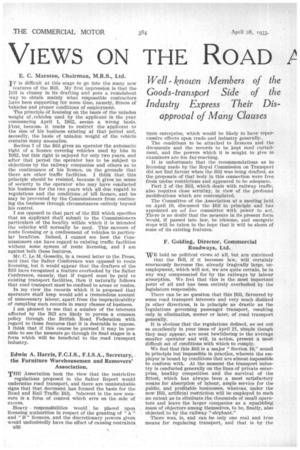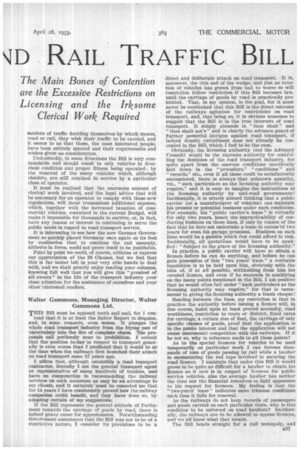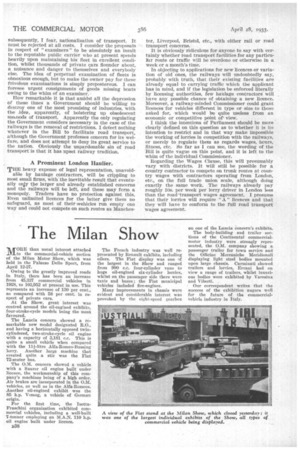VIEWS ON THE ROAD \ID RAIL TRAFFIC BILL
Page 54

Page 55

Page 56

If you've noticed an error in this article please click here to report it so we can fix it.
E. C. Marston, Chairman, M.R.S., Ltd.
JT is difficult at this stage to go into the many new
features of the Bill. My first impression is that the Bill is clumsy in its drafting and goes a roundabout way to obtain mainly what responsible contractors have been supporting for some time, namely, fitness of vehicles and proper conditions of employment.
The principle of licensing on the basis of the unladen weight of..vehicles used by the applicant in the year commencing April I, 1932, seems a wrong basis. First, because it tends to restrict the applicant to the size of his business existing at that period and, secondly, the basis of unladen weight of the vehicle contains many anomalies.
Section 7 of the Bill gives an operator the automatic right of a licence covering vehicles used by him in 1932, but this right is enjoyed for only two years, and after that period the operator has to be subject to objections by the railway companies and others as to the continuance of his licence, on the grounds that there are other traffic facilities. I think that this principle should be resisted, because it gives DO sense of security to the operator who may have conducted his business for the two years with all due regard to regulations and the conditions .of hit licence, and he may be prevented by the Commissioners from continuing the business through circumstances entirely beyond his control.
am opposed to that part of the Bill which specifies that an applicant shall submit to the Commissioners particulars of the locality within which it is intended the vehicles will normally be used. This savours of route licensing or a confinement of vehicles to particular localities. Indeed, I cannot see how the Commissioners can have regard to existing traffic facilities without some system of route licensing, and I am against both these features.
Mr. C. Le M. Gosselin, in a recent letter to the Press, said that the Salter Conference was opposed to route licensing, but it would appear that the drafters of the Bill have recognized a feature overlooked by the Salter Conference, namely, that if regard must be paid to existing transport facilities, then it naturally follows•that road transport must be confined to areas or routes.
In my view the records which it is proposed that operators shall keep would add a tremendous amount of unnecessary labour, apart from the impracticability of compiling such records in many classes of business.
I am pleased to see that a number of the Interests affected by the Bill are likely to pursue a common policy through the British Road Federation with regard to these features that it is desirable to oppose. I think that if this course be pursued it may be possible to see the measure go through its final stages in a form which will be beneficial to the road transport industry.
Edwin A. Harris, F.C.I.S., F.I.S.A., Secretary, the Furniture Warehousemen and Removers' Association.
THE Association took the view that the restrictive
regulations proposed in the Salter Report would undermine road transport, and there are unmistakable signs that that document has formed the basis for the Road and Rail Traffic Bill. Inherent in the new measure is a form of control which errs on the side of excess.
Heavy responsibilities would be placed upon licensing authorities in respect of the granting of " A " and " B " licences, and the discretionary powers given would undoubtedly have the effect of causing restraints 1336 upon enterprise, which would be likely to have repercussive effects upon trade and industry generally.
The conditions to be attached to licences and the documents and the records to be kept need curtailment, and the powers which it is sought to give to examiners are too far-reaching.
It is unfortunate that the recommendations as to licensing made by the Royal Commission on Transport did not find favour when the Bill was being drafted, as the proposals of that body in this connection were free from undue restrictions and appeared to be adequate.
Part 2 of the Bill, which deals with railway traffic, also requires close scrutiny, in view of the profound modifications which are contemplated.
The Committee of the Association at a meeting held on April 19, discussed the Bill in principle and has appointed an ad hoc committee with power to act. There is no doubt that the measure in its present form 'would, if passed into law, be irksome, and energetic steps will be taken in the hope that it will be shorn of some of its existing features.
F. Golding, Director, Commercial Roadways, Ltd.
WE hold no political views at all, but are convinced
that the Bill, if it becomes law, will certainly enormously increase the, already tragically large, unemployment, which will not, we are quite certain, be in any way compensated for by the railways by labour absorption. We feel that this is the most important point of all and has been entirely overlooked by the legislators responsible.
There can be no question that this Bill, favoured by some road transport interests and very much disliked in other directions, is in principle as drastic as the regulations governing passenger transport, resulting only in elimination, sooner or later, of road transport generally.
It is obvious that the regulations defined, as set out so excellently in your issue of April 21, simple though they may appear, are most bewildering to the average smaller operator and will, in action, present a most difficult set of conditions with which to comply.
We feel that this Bill is a major "Section 19," sound In principle but impossible in practice, wherein the employer is bound by conditions that are almost impossible to conform with. At the moment the transport industry is conducted generally on the lines of private enterprise, healthy competition and the survival of the fittest, which has always been a most satisfactory means for absorption of labour, ample service for the public, and profitable businesses, whereas, under the new Bill, artificial restriction will be employed to such an extent as to eliminate the thousands of small operators and leave the larger companies as a squabbling mass of objectors among themselves, to be, finally, also objected to by the railway "elephant."
There was, is, and can be only one real and true means for regulating transport, and that is by the senders of traffic deciding themselves by which means, road or rail, they wish their traffic to be carried, and it seems to us that these, the most interested people, have been entirely ignored and their requirements and wishes given no consideration.
Undoubtedly, in some directions the Bill is very commendable and should result in only vehicles in firstclass condition and proper fitness being operated ; by the removal of the many vehicles which, although obsolete, are still retained in service by a particular class of operator.
It must be realized that the enormous amount of clerical work involved, and the legal advice that will be necessary for an operator to comply with these new regulations, wilt incur tremendous additional expense, which, together with the increased taxation of commercial vehicles, contained in the current Budget, will make it impossible for thousands to survive, or, in fact, have any reason or interest in continuing to serve the public needs in regard to road transport service.
It is interesting to see how the new German Government so quickly placed Germany once again on its feet by realization that to continue the rail monoply, hitherto in force, could not prove itself to be justifiable.
Point by point we could, of course, criticize or express our appreciation of the 38 Clauses, !but we feel that this is far better left in your very able hands to deal with, and we shall greatly enjoy reading your columns, knowing full well that you will give this "greatest of all events" in the life of the transport industry your close attention for the assistance of ourselves and your other interested readers.
Walter Gammons, Managing Director, Walter Gammons Ltd.
THIS Bill must be opposed tooth and nail,. for I con
tend that it is at least the Salter Report in disguise, and, in some respects, even worse_ It plunges the whole road transport industry from the frying pan or uncertainty into the fire of complete chaos. The proposaLs sail perilously near to prohibition. I submit that the position to-day in respect to transport generally is even worse than I predicted that it would be at the time when the railways first. launched their attack on road transport some 12 years ago.
I affirm that, although ostensibly a road transport contractor, literally I am the general transport agent or representative of many hundreds of traders, and have no compunction in recommending the railway services on such occasions as may be an advantage to my clients, and it certainly -must be conceded me that for l years I have consistently proved how the railway companies could benefit, and they have done so, by adopting certain of my suggestions.
If the Bill represents the general attitude of Parlia-: ment towards the carriage of goods by road, there is indeed grave cause for apprehension. Notwithstanding Government:assurances that the Bill was not to be of a restrictive nature, / consider its provisions to be a
direct and deliberate attack on road transport. It is, moreover, the thin end of the wedge, and just as taxa tion of vehicles has grown from bad to worse so will restriction follow restriction if this Bill becomes law, until the carriage of goods by road is practically prohibited. That, in my opinion, is the goal, for it must never be overlooked that this Bill is the direct outcome of the railways agitation for restrictions on road transport, and, that being so, it is obvious nonsense to suggest that the Bill is in the true interests of road transport. It Simply abounds in "thou shalt" and " thou shalt not's " and is clearly the advance guard of further powerful intrigue against road transport, if indeed drastic curtailment does not already lie con" cealed in the Bill, which I feel to be the case.
Obviously, the licensing authority (not the Advisory Council) would be the supreme authority for controlling the destinies of the road transport industry, for quite apart from the onerous conditions specifically laid down in the "procedure," " conditions " and "records," etc., even if all these could be satisfactorily encountered, there is always that unknown quantity, viz., "such particulars as the licensing authority may require," and it is easy to imagine the instructions to the licensing authority by anti-road governments Incidentally, it is utterly absurd thinking that a public carrier (or a manufacturer of vehicles) can maintain his present or potential business under such conditions. For example, his " public carrier's lease" is virtually for only two years, hence the impracticability of conducting business on those lines, if only by reason of the fact that he dare not undertake a lease in excess 'of two years for even his garage premises. Business on such lines would :be a gamble which few could afford to risk. Incidentally, all quotations would have to be qualified: 'Subject to the grace of the licensing authority."
In practice, a public carrier will have to obtain a licence before he can do anything, and before he can gain possession of this "two years' lease" a veritable inquisition is to be held upon him, obviously with the idea of, if at all possible, withholding from him his coveted licence, and even if he succeeds in qualifying on the many points mentioned in the Bill, I am positive that he would often fail under "such particulars as the licensing authority may require," for that is tantamount to giving the licensing authority a blank cheque Reading between the lines, my conviction is that in practice the authority before issuing a licence will, in due course, insist upon at least proved necessity, road worthiness, restriction to route or district, fixed rates for carriage, a certain size of fleet, the carriage of only specific classes of goods, proof that the application is in the public interest and that the application will not cause uneconomic competition with the railways. If it be not so, why is reference made to all these points?
As to the special licences for vehieles to be used temporarily on particular work I can foresee thousands of tons of goods passing by rail while a haulier is enctaintering the red tape involved in securing the road licence. I maintain that under this Bill it would prove to be quite as difficult for a haulier to obtain his licence as it now is in respect of licences for public service vehicles, also the average haulier has neither the time nor the financial resources to fight opponents to his request for licences. My feeling is that the " two-years' lease" indicates more irksome conditions each time it falls for renewal.
As the railways do not keep records of passengers and goods carried on each particular train, why is this condition to be enforced on road hauliers? Incidentally, the railways are to be allowed to oppose licences, and we all know what that means.
The Bill heads straight for a rail monopoly, and subsequently, T fear, nationalization of transport. It must be rejected at all costs. I consider the proposals in respect of " examiners " to be absolutely an insult to the reputable public carrier who at present spends heavily upon maintaining his fleet in excellent condition, whilst thousands of private cars flounder about, a nuisance and danger to themselves and everybody else. The idea of perpetual examination of fleets is obnoxious enough, but to make the owner pay for these frivolous examinations is simply preposterous. I can foresee urgent consignments of goods missing beats owing to the whim of an examiner.
How remarkable it is that amidst all the depression of these times a Government should be willing to destroy one of the most promising of industries, with the .idea, apparently, of bolstering up obsolescent inane& of transport. Apparently the only regulating the Government considers necessary in the case of the railways is the removal of restrictions. I detect nothing whatever in the Bill to facilitate road transport, although the Government professes concern for its welfare, and does not attempt to deny its great service to the nation. Obviously the unpardonable sin of road transport is that it has upset railway tradition.
A Prominent London Haulier.
THE heavy expense of legal representation, unavoid
able by haulage contractors, will be crippling to most small firms, with the inevitable result that eventually (V the larger and already established concerns and the railways will be left, and these may form a monopoly. Traders have no protection against this. Even unlimited licences for the latter give them no safeguard, as most of their Itvehicles run empty one way and could not compete on such routes as Manches
ter, Liverpool, Bristol, etc., with either rail or road transport concerns.
It is obviously ridiculous for anyone to say with certainty whether road transport facilities for any particuIar route or traffic will be overdone or otherwise in a week or a month's time In objecting to applications for new licences or variation of old ones, the railways will undoubtedly say, probably with truth, that their existing facilities are already equal to carrying traffic which the applicant has in mind, and if the legislation be enforced literally by licensing authorities, few haulage contractors will have any possible chance of obtaining a new licence. Moreover, a railway-minded Commissioner could grant licences for vehicles different in type or size to those asked for, which would be quite useless from an economic or competitive point of view.
I think the intentions of Parliament should be more clearly' defined on this question as to whether it is its intention to restrict and in that way make impossible the working of lorries in competition with the railways, or merely to regulate them as regards wages, hours, fitness, etc. So far as I can see, the wording of the Bill is quite vague on this point, and it is left to the whim of the individual Commissioner.
Regarding the Wages Clause, this will presumably vary with districts. It will still be possible for a country contractor to compete on trunk routes at country wages with contractors operating from London, etc., on the full trade union scale, although doing exactly the same work. The railways already pay roughly 10s. per week per lorry driver in London less than the road *transport wages agreement. I presume that their lorries will require " A " licences and that they will have to conform to the full road transport wages agreement.




































































































